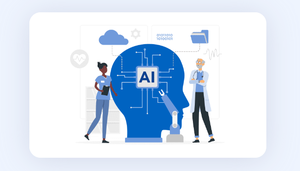AI in Medicine Examples: Revolutionizing Healthcare
Body
1. Introduction
In the dynamic landscape of healthcare, the integration of artificial intelligence has ushered in a new era. This article dives into the realm of AI in medicine examples, shedding light on transformative technologies that redefine patient care, diagnostics, and treatment methodologies.
2. The Rise of AI in Medical Imaging
Unraveling the potential of AI in medicine, one standout application is in medical imaging. Advanced algorithms analyze radiological images with unprecedented accuracy, aiding in early disease detection and precise treatment planning.
3. Enhancing Diagnostic Accuracy with AI
Explore how AI algorithms surpass human capabilities in diagnostic accuracy. From detecting subtle anomalies in medical scans to predicting disease progression, AI augments the diagnostic precision of healthcare professionals.
4. Personalized Treatment Plans
Delve into the realm of personalized medicine, where AI tailors treatment plans based on individual patient data. Witness how AI optimizes medication regimens, minimizing side effects and maximizing therapeutic efficacy.
5. Chatbots in Healthcare Consultation
Experience the integration of AI-powered chatbots in healthcare consultation. These virtual assistants provide instant support, answer medical queries, and offer a convenient avenue for patients to access healthcare information.
6. Remote Patient Monitoring
Discover how AI facilitates remote patient monitoring, revolutionizing chronic disease management. Real-time data analysis enables timely interventions, fostering a proactive approach to healthcare.
7. AI-Assisted Robotic Surgeries
Embark on a journey into the operating room, where AI collaborates with surgeons in robotic procedures. Witness the precision and efficiency of AI-assisted surgeries, minimizing invasiveness and enhancing surgical outcomes.
8. Drug Discovery Acceleration
Uncover the role of AI in expediting drug discovery processes. Through data analysis and pattern recognition, AI accelerates the identification of potential drug candidates, streamlining the path to innovative pharmaceuticals.
9. Predictive Analytics for Epidemic Control
Explore how AI contributes to epidemic control through predictive analytics. Analyzing vast datasets, AI models forecast disease trends, enabling timely public health interventions for effective epidemic management.
10. Ethical Considerations in AI Healthcare
Navigate the ethical landscape of AI in medicine, addressing concerns related to patient privacy, bias in algorithms, and the responsible deployment of these transformative technologies.
11. Challenges and Opportunities
Examine the challenges and opportunities presented by the integration of AI in medicine. From data security concerns to the potential for groundbreaking advancements, the journey is not without its complexities and promises.
12. Future Trajectory of AI in Medicine
Peer into the future as AI continues to evolve in the medical field. Anticipate groundbreaking developments that hold the promise of further enhancing patient care and reshaping the healthcare landscape.
AI in Medicine Examples Section
AI in medicine examples abound, showcasing the profound impact of artificial intelligence on healthcare. From the accuracy of diagnostic procedures to the optimization of treatment plans, these examples underscore the transformative power of AI in the medical domain.
AI in Medicine Example 1: Medical Imaging Precision
In the realm of medical imaging, AI algorithms exhibit unmatched precision. Whether identifying minute anomalies in X-rays or enhancing the clarity of MRI scans, AI revolutionizes the accuracy of medical diagnostics.
AI in Medicine Example 2: Personalized Treatment Algorithms
AI's ability to analyze vast datasets allows for the creation of personalized treatment algorithms. By considering individual patient data, AI tailors treatment plans, ensuring optimal outcomes while minimizing adverse effects.
AI in Medicine Example 3: Chatbot Assistance in Healthcare
AI-driven chatbots serve as virtual healthcare assistants, providing immediate support and information. Patients benefit from quick responses to medical queries, contributing to an enhanced healthcare experience.
AI in Medicine Example 4: Remote Patient Monitoring Precision
With AI, remote patient monitoring becomes a precise and proactive process. Real-time analysis of health data enables healthcare providers to intervene promptly, improving overall patient care.
AI in Medicine Example 5: Robotic Precision in Surgery
AI's collaboration with robotic systems enhances surgical precision. Surgeons benefit from real-time data analysis, ensuring accuracy in procedures and minimizing invasiveness for improved postoperative outcomes.
AI in Medicine Example 6: Accelerated Drug Discovery
The integration of AI expedites drug discovery by analyzing vast datasets. This transformative approach identifies potential drug candidates more rapidly, accelerating the development of innovative pharmaceuticals.
FAQs
AI in Medicine Examples FAQ
Q: How does AI enhance diagnostic accuracy in medicine? AI surpasses human capabilities in diagnostic accuracy by analyzing medical images with unprecedented precision. This results in early detection and improved treatment planning.
Q: Can AI really tailor treatment plans based on individual patient data? Yes, AI utilizes advanced algorithms to analyze individual patient data, enabling the creation of personalized treatment plans that maximize efficacy and minimize side effects.
Q: Are AI-assisted surgeries more precise than traditional surgeries? Absolutely. AI collaborates with surgeons in robotic procedures, enhancing precision and minimizing invasiveness, leading to improved surgical outcomes.
Q: How does AI contribute to drug discovery? AI expedites drug discovery by analyzing vast datasets, identifying potential drug candidates, and streamlining the development process.
Q: What ethical considerations surround the use of AI in healthcare? Ethical considerations include patient privacy concerns, bias in algorithms, and the responsible deployment of AI technologies in healthcare settings.
Q: What challenges and opportunities are associated with AI in medicine? Challenges include data security concerns, while opportunities lie in groundbreaking advancements that can reshape the healthcare landscape positively.
Conclusion
In conclusion, AI in medicine exemplifies a paradigm shift in healthcare, offering innovative solutions to age-old challenges. As we navigate the ethical considerations and challenges, the opportunities presented by AI in medicine pave the way for a future where patient care reaches unprecedented levels of precision and personalization.









Comments